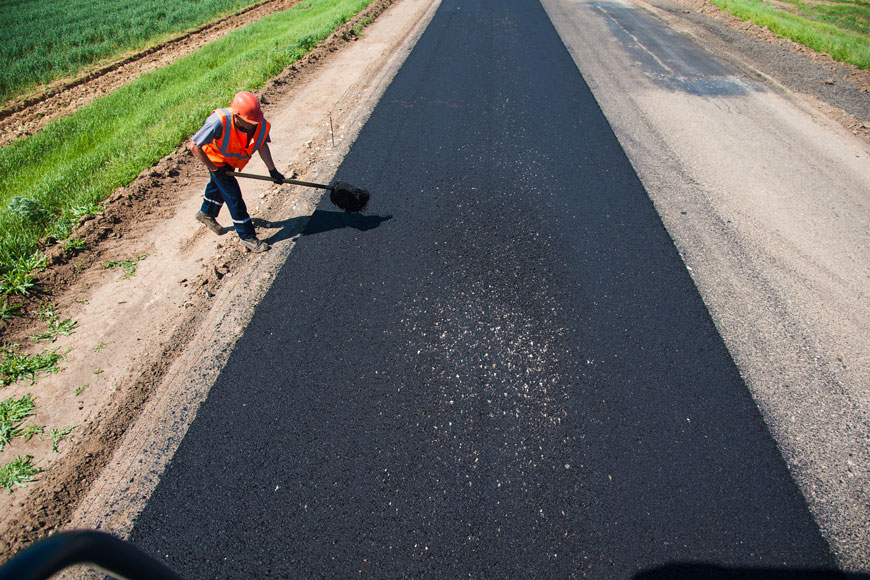Boost Aesthetic Allure and Capability: Hot Mix Asphalt for Regrading Projects
Checking Out the Ecological Benefits of Warm Mix Asphalt
The application of Warm Mix Asphalt in facilities jobs offers an engaging instance for lasting advancement and environmental stewardship. By diving right into the intricate details of its manufacturing processes and the ingenious usage of recycled materials, a much deeper understanding arises of just how this innovation surpasses mere surface applications. The environmental benefits of Warm Mix Asphalt expand much beyond first perceptions, using a nuanced point of view on just how this product can lead the way for a greener future.

Minimized Greenhouse Gas Emissions
Warm Mix Asphalt production uses a substantial reduction in greenhouse gas discharges contrasted to various other sidewalk products. The production process of Hot Mix Asphalt entails warming the mixture of aggregate and asphalt binder to high temperature levels. This procedure requires less energy contrasted to the manufacturing of alternative pavement materials, resulting in lower greenhouse gas discharges. Furthermore, the usage of recycled materials in Warm Mix Asphalt better adds to decreasing its environmental effect. By integrating recovered asphalt pavement and recycled asphalt roof shingles into the mix, the need for virgin materials is minimized, causing power cost savings and reduced emissions connected with removal and processing.
Research studies have revealed that Hot Mix Asphalt pavements have a smaller sized carbon impact over their life cycle contrasted to various other pavement alternatives. The durability and recyclability of Warm Mix Asphalt even more enhance its ecological advantages by lowering the requirement for frequent upkeep or replacement, therefore saving sources and reducing discharges connected with repair activities.
Power Efficiency and Preservation
The manufacturing process of Hot Mix Asphalt not just minimizes greenhouse gas emissions but additionally contributes dramatically to energy performance and conservation efforts. Energy effectiveness is a crucial advantage of Warm Mix Asphalt production compared to other sidewalk types. The procedure entails heating up the materials at heats to produce the asphalt mix, which calls for less power than alternative techniques. Furthermore, the ability to reuse and recycle asphalt sidewalk further improves power conservation. By integrating redeemed asphalt pavement (RAP) into new blends, the market conserves power that would have been needed to produce totally new materials. The durability of Hot Mix Asphalt minimizes the regularity of upkeep and reconstruction, leading to long-term energy financial savings. This longevity reduces the energy-intensive processes included in constant fixings and replacements. Generally, Warm Mix Asphalt stands apart as an ecologically pleasant choice that focuses on energy effectiveness and preservation throughout its lifecycle.
Sustainable Pavement Solutions

One key element of sustainable pavement services is making use of recycled materials such as reclaimed asphalt sidewalk (RAP) and recycled asphalt shingles (RAS) By incorporating these products right into the asphalt mixtures, the need for virgin sources is reduced, leading to lower power intake and greenhouse gas exhausts throughout production. Furthermore, the reuse of these materials helps divert waste from land fills, adding to an extra lasting and circular economic climate.
Moreover, sustainable pavement services concentrate on enhancing pavement design to boost performance and longevity. Techniques such as cozy mix asphalt (WMA) and rock mastic asphalt over here (SMA) enhance the longevity and durability of pavements, lowering the demand for regular repair work and replacements. By implementing these cutting-edge techniques, framework designers can create sidewalks that not only meet high-performance criteria however also minimize their environmental impact.
Minimized Environmental Impact
Hot mix asphalt, in specific, supplies several advantages that add to decreasing the overall ecological impact of road facilities. One vital aspect is the recyclability of asphalt, which can be reused multiple times without endangering its top quality - Regrading.
Moreover, the manufacturing of hot mix asphalt gives off reduced levels of greenhouse gases contrasted to various other pavement materials, making it a much more eco-friendly option. The power efficiency of asphalt plants has likewise enhanced for many years, leading to decreased fuel usage and lower discharges. In addition, the smooth surface area of warm mix asphalt reduces rolling resistance for cars, causing lower fuel consumption and decreased air contamination from automobile emissions.
Contribution to Climate Modification Mitigation
Hot mix asphalt plays an essential function in mitigating environment adjustment via its lasting properties and reduced environmental impact. One significant payment to environment modification mitigation comes from the energy performance of warm mix asphalt manufacturing. Compared to other sidewalk alternatives, the production process for hot mix asphalt consumes much less power and produces lower degrees of greenhouse gases, thus decreasing its overall carbon impact.
Furthermore, warm mix asphalt's ability to show visit sunlight, understood as albedo, assists in lowering city warmth island results. By minimizing heat absorption and retention, warm mix asphalt pavements can decrease the demand for air conditioning in metropolitan areas, consequently lowering greenhouse gas discharges connected with power consumption for cooling down objectives.
Furthermore, the longevity and recyclability of warm mix asphalt further boost its climate change reduction abilities. Regrading. The long life-span of asphalt pavements lowers the requirement for constant repair services or substitutes, eventually decreasing the carbon discharges connected to road upkeep activities. Furthermore, the recyclability of asphalt products reduces the need for virgin resources and decreases the environmental effect of pavement building and construction, lining up with sustainable techniques for climate adjustment mitigation.
Verdict
To conclude, the environmental advantages of Warm Mix Asphalt show its significant contribution to decreasing greenhouse gas discharges, preserving energy, and lessening ecological impact. This sustainable pavement remedy straightens with climate change reduction efforts, promotes source preservation, and boosts infrastructure advancement. By making use of recycled products, energy-efficient manufacturing processes, and resilient style, Warm Mix Asphalt plays an important function in cultivating a more eco-friendly approach to infrastructure building.
The production process of Warm Mix Asphalt entails warming the combination of accumulation and have a peek here asphalt binder to high temperature levels. By including redeemed asphalt sidewalk and recycled asphalt roof shingles right into the mix, the requirement for virgin materials is decreased, leading to energy cost savings and reduced discharges linked with extraction and handling.
One trick facet of lasting pavement services is the use of recycled materials such as redeemed asphalt pavement (RAP) and recycled asphalt tiles (RAS) Methods such as cozy mix asphalt (WMA) and stone mastic asphalt (SMA) improve the toughness and durability of sidewalks, minimizing the requirement for frequent repair work and substitutes. Compared to other sidewalk alternatives, the manufacturing process for warm mix asphalt takes in less energy and discharges lower degrees of greenhouse gases, hence decreasing its overall carbon impact.